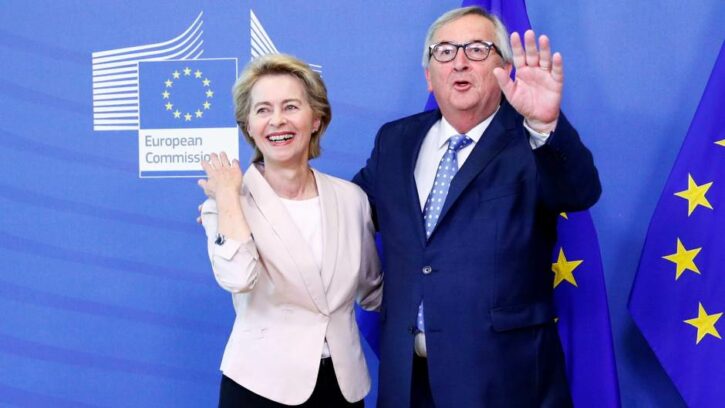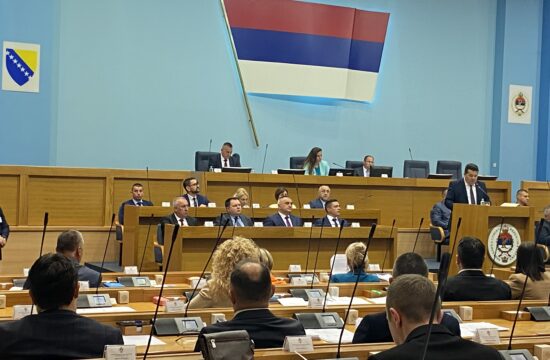
Germany's Ursula von der Leyen is on the verge of succeeding Jean-Claude Juncker to become the European Commission's first female president on Tuesday -- if leaders of the 28 EU member states have their way.
A long-time ally to German Chancellor Angela Merkel, and the only minister to have served in Merkel's cabinet since she came to power back in 2005, von der Leyen's nomination to replace Juncker was unexpected since she wasn't even a candidate.
“She didn't campaign, she never came out, she didn't take part in any debate,” explains Anna Nadibaidze from the policy think tank, Open Europe.
European leaders nominated the German defense minister to lead the Commission after they failed to agree on any of the “Spitzenkandidat” nominees who are put forward by European political parties ahead of the EU elections. Von der Leyen beat the original frontrunner for the role Dutch socialist Frans Timmermans.
And while her nomination was supported by a majority of EU leaders, it's unclear if she'll receive the same support when 751 Members of the European Parliament vote to approve the appointment on Tuesday.
Nomination seen as a ‘backroom’ deal
Von der Leyen, 60, may not receive the majority she requires from parliament, due to critics branding her nomination a “backroom” deal.
“Her nomination is mostly seen as a French-German deal that was done behind closed doors and some people call it a stitch-up,” Nadibaidze told CNN.
“That's the danger – that she might not get accepted specifically because of the process.”
Domestically, Nadibaidze says, von der Leyen has faced a lot of criticism, particularly from Merkel's coalition partners the Social Democrats (SPD), who are upset that EU leaders ignored the top candidates after days of horse-trading.
“They think she's one of the weakest ministers (and) that she couldn't command the army,” Nadibaidze explains. “There was also an article in the German press saying that how the German army is happy to get rid of her.”
Born in Brussels and multilingual, there's no denying von der Leyen has a European background – something, Nadibaidze says, the German has been using to her advantage “when she tries to convince MEPs to vote for her.”
Left-leaning groups ‘deeply unhappy’
As a member of the center-right Christian Democratic Union (CDU), von der Leyen can rely on the support of allied MEPs from the largest political group in parliament – the European People's Party (EPP).
Von der Leyen's colleague from the CDU, Gunther Krichbaum, says he's known her for many years, and told CNN he was convinced she would be an excellent president.
“She has always been extremely competent, assertive and reliable, but also always conciliatory,” he added.
But when it comes to support from the EU's left-leaning groups – it's a different story.
The EU's second largest political group, the Progressive Alliance of Socialists and Democrats (S&D), which has 154 seats in parliament, has said it is “deeply unhappy” about von der Leyen's nomination, believing Timmermans “was by far the best-qualified candidate and was the person to deliver the change Europe needs.”
The S&D added that “large questions remain” following von der Leyen's grilling last week, and that it was awaiting a reply to a letter outlining that party's key demands before deciding whether it will vote in favor for her or not.
Meanwhile, both the Greens/European Free Alliance (Greens/EFA) group and the Confederal Group of the European United Left — Nordic Green Left (GUE/NGL) have announced that they would not be supporting her because of her policy vagueness.
Greens/EFA MEP Sven Giegold called von der Leyen “unspecific” on where she stands, with “largely evasive” responses, “rather than clear attitudes and positions.”
“The next EU Commission must act harder, not softer, against the breach of European values,” Giegold told CNN.
Both groups also said despite von der Leyen telling lawmakers last Wednesday that she supports the EU going carbon neutral by 2050, it was not enough.
Greens/EFA President Ska Keller said in a statement that the group does not see “how change will be possible” with a candidate like her.
Presidency ‘might be compromised’
If von der Leyen's nomination is approved by MEPs in a secret ballot on Tuesday evening, she'll lead the EU's executive body and provide political guidance to the Commission — which proposes new laws, manages the EU budget and is responsible for enforcing EU law.
However, if she commands a majority by relying on nationalists in eastern Europe, her presidency “might be compromised,” right from the start, Nadibaidze says.
To secure a majority, von der Leyen will likely need the support of the European Conservatives and Reformists (ECR) – which is largely made up of MEPs from Poland's populist Law and Justice (PiS) party, and the right-wing Identity and Democracy group – formed by Matteo Salvini's Italian Northern League and Marine Le Pen's French National Rally.
“If they support her and the Greens don't, that's going to be very strange to see,” Nadibaidze told CNN.
“She's going to have a lot of trouble because the Greens are an important group – they're the fourth largest, they're pro-EU, they've been growing in the last years and I just don't see it lasting so long without their support in Parliament, especially if euro-sceptic parties and even the far-right support her.”
Greens/EFA MEP Giegold told CNN that von der Leyen “should now avoid forming a majority with the votes of the right-wing populists in parliament.”
“If von der Leyen was to take office from the enemies of Europe, that would be a catastrophic sign,” he added.
If on Tuesday MEPs reject von der Leyen's presidency, European leaders will need to head back to the drawing board.




